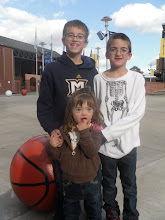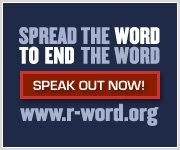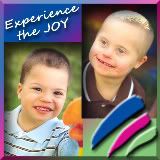Where's Quinny? Well right now she is safe and sound in her crib up in her room - sleeping peacefully with her quilts from her Auntie Sharon and Grandma Shirley wrapped around her, providing her comfort. But let's say that Quinny lived in the United States at a different time, let's say in the 1950s, where would she be when she was 16 months old? I really really hope the answer would be the same - that she would be in her crib, but in our country in the 1950s the norm was radically different than it is today. Would I have been brave enough to do the same thing as today even if it meant going against the norm?
A great documentary to watch is Where's Molly (2007). This is where my original question, the title of this post comes in. In Where's Molly, Jeff Daly was a six-year-old boy who loved his little sister, Molly, more than anything. He was a fabulous big brother, like my boys Riley and Aidan. Well right before Molly turned three, her parents learned something about her from medical doctors. These doctors told Molly's mother and father that Molly was severely cognitively disabled and highly recommended that they place her in an institution and forget about her. They gave the family no other support, no other help (not much of support for such things existed in those days). Molly's mother did just that - tried to forget about Molly, but Molly's father tried to visit her for a while until he was told by the staff that it was better if he didn't come (it upset Molly too much when he had to leave and she turned to self-abuse). Well the saddest part of the whole story is that one day Jeff had a little sister, and the next day she was gone. How could a six-year-old cope with this? He was forbidden by his parents to talk about her. It was just like she vanished, even the memory of her. This was a prime example of denial.
This documentary is a powerful depiction of a very sad part of our history, a time when there was a great stigma on having a child with special needs, even a belief that having a cognitively disabled child somehow reflected a problem that existed in the parents. I don't think Quinn is any reflection upon my weaknesses, in fact she is the reflection of everything good in me and my family. But those were unfortunately the beliefs of that day. If you watch this documentary, and I highly recommend it, be sure to get out the tissues. There are scenes from the institution (an advertisement showing their "great" services) and these scenes are horrific. Little children just lying in their cribs, sitting doing nothing on a porch, supposedly getting the greatest "care" possible with no families to love them. There are a lot of little ones with Down syndrome in the footage (although Molly does not have Down syndrome) and this is the most heartbreaking part to me - for I see Quinny in their faces - in their lonely, neglected faces.
But it ends well for Molly and Jeff; despite the years that were stolen from them, this is a story of love and survival. After Jeff's parents died, he found information in their files on Molly's whereabouts and reconnected with her. She had since moved from the institution, which thankfully closed, and into a group home. His love for her is such a beautiful thing to see in the movie. Riley and Aidan will know the same love with Quinn, without having it ever stolen from them. And now Jeff and Molly advocate for others, showing the true strength of families of children with special needs.
But such a thing would never happen today, right?
There are other countries like Russia, Ukraine, and Bulgaria (and even more) where institutionalization of children with cognitive disabilities is still the norm. Check out this website, http://www.reecesrainbow.com/ where you will see wonderful people who are trying to find these children homes. Maybe they will move you to help in some way.
But we, in the United States, are too civilized for such a thing to happen, surely? We have come a long way in our tolerance of individuals with cognitive disabilities, right?
In the US there are more and more babies with Down syndrome who are now being prenatally diagnosed. We were one of them. A prenatal diagnosis isn't necessarily a bad thing. For us, it was a blessing. It allowed us to meet some awesome people and to prepare ourselves for this journey. But it is estimated that 92% of the babies who are prenatally diagnosed are terminated. How much this option is pushed really depends upon your medical care. Thankfully we had very open-minded doctors who didn't push this option. They were very positive and balanced in the information they provided us. But some other families can feel more pressure to terminate like Molly's parents felt in institutionalizing her. True, some of these babies may have significant health concerns. True, abortion is also legal at this time. But what gets me is this, Quinn is perfectly healthy and beautiful. She was a baby that we wanted to have and was planned. I also did not experience any life-threatening complications with her. But still Quinn could have been terminated for nothing more than having Down syndrome. This does happen. A lot. Now don't fear any liberal readers who personally know me out there, I am still my liberal self (and don't wish to get in a pro-life/pro-choice debate here), but I see this as becoming a different way people in the US have tried to deal with this supposed "problem." A different kind of denial - not the same as shipping them off to institutions, now instead we deal with the "situation" before they are born. Sounds horrible, doesn't it? But could it be true? Maybe. I hope that it is not, because that is so sad and what would that say about us?
Happily though I know where Quinny is and I am blessed to have her.
-Karyn
What day is it, even?
5 years ago



















